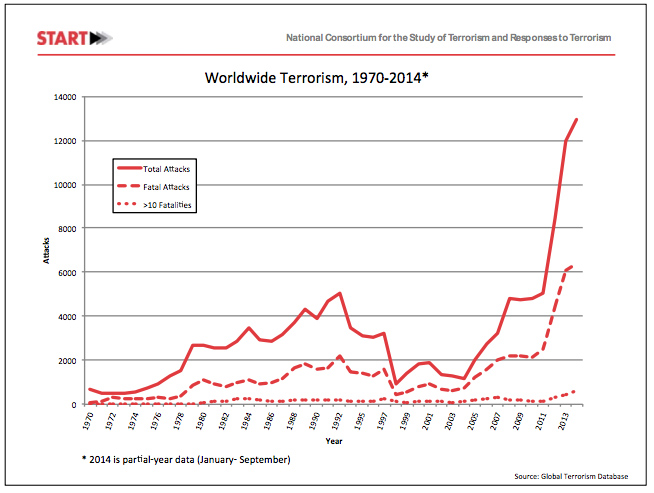President Obama’s claim this week that there is “probably less war and less violence” around the world today than there was three or four decades ago was as accurate as presidential candidate Ted Cruz’s claim that the U.S. tax code contains more pages than the Bible.
Guess which statement has been challenged by media’s most prominent self-declared fact checkers?
The Washington Post’s fact checker, Glenn Kessler, told the Washington Examiner’s media desk Wednesday that he had “missed” Obama’s comments, but that he would “certainly consider” reviewing them.
Factcheck.org’s director, Eugene Kiely, declined to say whether his organization would examine the president’s remarks, saying in an email to the Examiner that their group doesn’t “give interviews on subjects that we haven’t fully researched.”
Kiely did note, however, that factcheck.org had written about this subject in 2011 “when the Rev. Billy Graham said wars, famines and earthquakes were occurring with more frequency.
“That, of course, is a bit out of date now,” Kiely told the Examiner.
PolitiFact editor Angie Holan told the Examiner that the the award-winning fact-check project by the Tampa Bay Times is not “at the moment” reviewing the president’s comments, and that it wouldn’t have anything published Wednesday afternoon.
“But you’re right, the claim would make a good fact-check,” she said.
PoltiFact in 2014 fact-checked TheBlaze’s Stu Burguiere in 2014 when he ungrammatically said that there are “less wars” and “less people dying in wars than there have been in quite some time.”
A spokesman for the Associated Press did not respond to the Examiner’s requests for comment.
Obama’s remarks regarding world violence came during an interview Monday with MSNBC’s Chris Matthews.
Referring to recent unrest in the world, particularly in the Middle East, which has in recent years witnessed the rise of the Islamic State, political coups, massacres carried out by Boko Haram and the widespread persecution of Christians, Obama said people should put things into “perspective.”
“The Middle East and North Africa are going through changes that we haven’t seen in our generation. I think the Islamic world is going through a process where they have to isolate and push out the kind of extremism that we’ve seen expressed by ISIL,” Obama said.
The president said that it would take a “generational project” for the Middle East to fix its extremism problem.
“It’s going to take some time but I remind people that, you know, there actually is probably less war and less violence around the world today than there might have been 30-40 years ago. It doesn’t make it any less painful. But things can get better,” he said, adding that Americans must remain “vigilant.”
Secretary of State John Kerry joins Obama in stating that the world is less violent today than it was a few decades ago.
“[T]here is actually less threat and less probability of people dying in some sort of violent conflict today than at any time in human history,” Kerry said in February when he testified before the House Appropriations Committee.
Backing up the administration’s claims are data from the Uppsala Department of Peace and Conflict Resolution, which show major and minor conflicts having peaked in 1991 and declined substantially, though not consistently, in the nearly quarter-century since. Uppsala’s figures end at 2013, but they indicate Obama’s claim that 2015 is less violent than either 1985 or 1975.
A highest-ranking official in the Obama administration, however, notes that the long-term decline in violence may have been bucked recently.
“[W]hen the final accounting is done, 2014 will have been the most lethal year for global terrorism in the 45 years such data has been compiled,” National Intelligence Director James Clapper told the Senate Armed Services Committee in February.
For the first nine months, Clapper said, data showed 13,000 terrorist attacks killed 31,000 people, which is an increase from the 11,500 attacks that killed 22,000 people worldwide in 2013.
Clapper is not alone in his assessment of the global threat posed by terrorism.
William Braniff, the executive director of the National Consortium for the Study of Terrorism and Responses to Terrorism, also said in February that the there has been an unprecedented increase in terrorism worldwide.
“The trend lines are alarming; we are seeing considerable year on year increases in both the number of terrorist attacks and fatalities due to terrorism,” Braniff testified in February before the House Armed Services Committee.

The Washington Free Beacon, a frequent critic of the president, noted that Obama’s broad claim — that there is less violence today than there was during the height of the Cold War — is “factually true.”
“Obama’s comments can be seen as an acknowledgement that conditions around the world are not great. As President Obama noted, however, ‘things can get better,'” the Free Beacon reported, acknowledging that there is widespread turmoil in the Middle East as well as in territories targeted by a resurgent Russia.
Media’s biggest fact-checking groups’ apparent disinterest in the president’s remarkable claim stands in contrast to the impressive amount of effort they have spent scrutinizing Republican lawmaker’s jokes and rhetorical flourishes.

